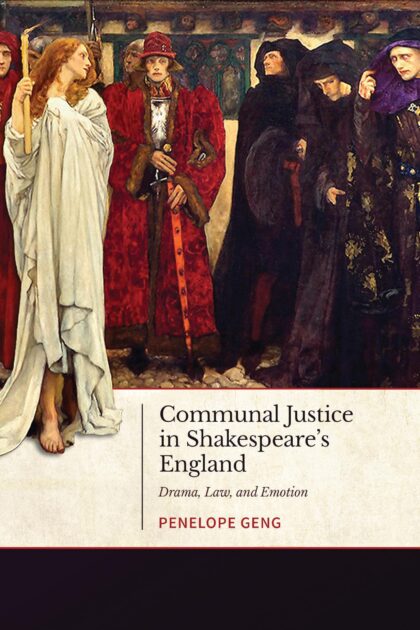Book Reviews
Review of Penelope Geng, Communal Justice in Shakespeare’s England: Drama, Law, and Emotion
 Situated at the intersection between the fields of law and literature, Penelope Geng’s book, Communal Justice in Shakespeare’s England: Drama, Law, and Emotion (University of Toronto Press, 2021. xiv, 257), explores the way early modern playwrights, especially in the late sixteenth and early seventeenth centuries, offered playgoers stories which position lay people, rather than professional magistrates, as effective administrators of justice. Geng persuasively demonstrates that while the late sixteenth century witnessed an increasing professionalization of the common law and an attendant attack by professional lawyers and magistrates on lay involvement in the law, theatres offered a counternarrative about “lay magistrates upholding the tenets of communal justice”, which “served as a pointed refusal of the law’s relentless centralization and professionalization” (xii). Throughout the book, Geng carefully delineates the suitability of the early modern playhouse as a space where concepts of communal justice could be explored, drawing attention to the communal, collective nature of playgoing and the way plays often acknowledge the audience and invite their judgment.
Situated at the intersection between the fields of law and literature, Penelope Geng’s book, Communal Justice in Shakespeare’s England: Drama, Law, and Emotion (University of Toronto Press, 2021. xiv, 257), explores the way early modern playwrights, especially in the late sixteenth and early seventeenth centuries, offered playgoers stories which position lay people, rather than professional magistrates, as effective administrators of justice. Geng persuasively demonstrates that while the late sixteenth century witnessed an increasing professionalization of the common law and an attendant attack by professional lawyers and magistrates on lay involvement in the law, theatres offered a counternarrative about “lay magistrates upholding the tenets of communal justice”, which “served as a pointed refusal of the law’s relentless centralization and professionalization” (xii). Throughout the book, Geng carefully delineates the suitability of the early modern playhouse as a space where concepts of communal justice could be explored, drawing attention to the communal, collective nature of playgoing and the way plays often acknowledge the audience and invite their judgment.
The introduction carefully explores the tension between professional and non-professional accounts of magistracy, between the professional insistence on policing lay judgment in law and a Calvinist-inflected theology of conscience which insisted on everyone’s right to judge good from evil, granted by the conscience ‘implanted in the human heart by God’ (18-19). The following chapters examine the way the selected early modern plays reveal tension between popular and professional legal culture, arguing that they affirm their audience’s lived…
Please login or subscribe to continue reading.
Please subscribe to The Shakespeare Newsletter to continue reading.
Subscribe Now